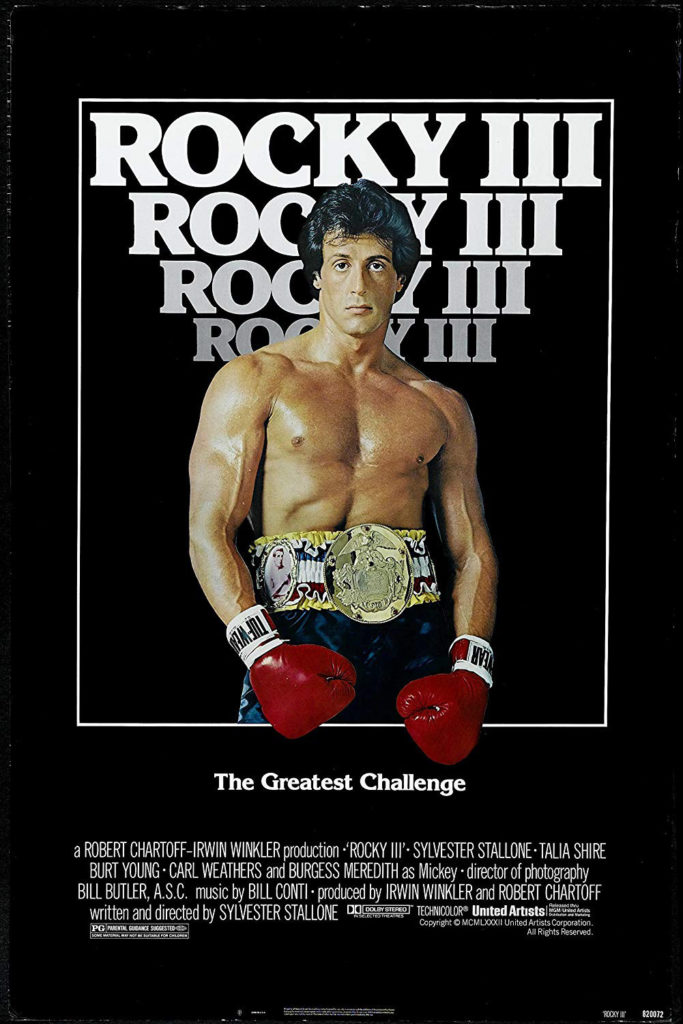It’s time to confront the truth, all you Rocky revisionists out there. Rocky Balboa was not a great fighter. He was raw and explosive, with a head hard enough to last against a champion who didn’t take him seriously. As Apollo Creed himself said to Rocky, “You fight great, but I’m a great fighter.” Also, great fighters don’t get KO’d in the 2nd round.
All kidding aside, Sylvester Stallone, the creator of Rocky, had himself a writing challenge following the success of the first two Rocky films. In the first, he was the working class hero who was given a shot at the big time, and took it further than anyone would have guessed. In the second film, everything was the same, only there was more melodrama, followed by victory. Making the same film for the third time in a row would have been a disaster for Sly and company. Where could the character go next?
The Hollywood instinct would be to put Rocky on top of the mountain, and then watch him tumble all the way down. That’s what Sly did with his screenplay for Rocky III, but there’s also a fair amount of nuance that was missing from Rocky II.
Rocky (played by Sly, of course), as seen in an opening recap of the previous film, is now the heavyweight champion of the world, with all that entails. Big matches, big money, big respect. Except there’s another fighter out there who isn’t buying into any of it. Clubber Lang (Mr. T) is a true contender. He’s a brutal fighter  who knocks out everyone he faces. But instead of getting his shot at the title, he sees Rocky take on one over-the-hill fighter after another, never being seriously challenged.
who knocks out everyone he faces. But instead of getting his shot at the title, he sees Rocky take on one over-the-hill fighter after another, never being seriously challenged.
He’s not imagining things. Rocky’s trainer, Mickey (Burgess Meredith), knows his fighter. He knows where he comes from and how much of his boxing ability is predicated on its raw nature. He knows that athletes that come out of nowhere often end up back there after a short amount of time, so he makes sure that Rocky has a string of opponents who aren’t true threats. Rocky gets to keep his belt and live like a champ, and he’s none the wiser that there’s a little bit of taint on his accomplishments.
Clubber isn’t content to let promoters and trainers work out when he gets his shot, so he hounds Rocky in public, goading him into one final title defense before retirement. Rocky, of course, gets his ass kicked, going down early. Now we’re in the meat of the film. Rocky is way down. Not only is he no longer the champ, he’s facing doubts more profound than those he had before the big fight in the first film. Clubber has beaten the confidence out of Rocky. Rocky is scared of Clubber Lang. Without at least one sports training montage, there’s no way he’ll be able to set foot in the ring and win back his belt and his dignity. It’s a good thing, then, that Apollo Creed (Carl Weathers) is there to train his former opponent.
That’s pretty much it. Rocky is about the only character in the film with any sort of complexities. Clubber is a brute, Rocky’s family, with the exception of one scene with Adrian (Talia Shire) giving Rocky the business, is one-dimensional, and everyone else kind of fades into the background. This is a movie with a singular theme, and that theme is desire. Who wants the belt more, Rocky or Clubber? Who is going to be in the most intense training montage? Whoever that is, whoever grunts the most and pours out the most sweat will be the most prepared for the final fight.
The journey to that final fight is much less fraught than in the previous film, and that showed Sly’s growth as a storyteller. Like Rocky II, this film was directed by Sly, and he showed that he learned from his mistakes. The pacing in this film is much tighter. Plot elements don’t feel packed in, but rather flow naturally. The film has a 100-minute runtime that not only flies by, but feels like it consists of only a handful of scenes.
The character of Rocky was threatening to descend into cliché, but in making Rocky somewhat of a paper champion who is searching for personal and professional redemption, Sly instead made him multi-dimensional. It would have been easy to just make Rocky the greatest fighter in the world after he wins the belt, but it’s more honest to keep Rocky as flawed. Clubber Lang doesn’t get the same deft treatment as a character, existing as little more than a constantly pissed-off representation of Rocky’s worst fears. Mr. T didn’t put in the best of readings when he had more than one or two lines to string together, but he nailed the intimidation factor. What is unfortunate is that he didn’t get a similar amount of character development as Apollo Creed received in the first film. That makes him seem other than human, which can rankle if one watches this flick with politics on the brain.
Rocky III is simple, and also satisfying. It breaks away temperamentally and stylistically from the previous entries while keeping the basic template intact. That’s a fancy way of saying that all Rocky films are alike, but that’s not a bad thing. All Rocky films are alike in the way that all Dracula films are alike. Or all Star Wars films are alike. What is important is that this is a more entertaining and watchable film than Rocky II, which gets worse the more I think about it.
